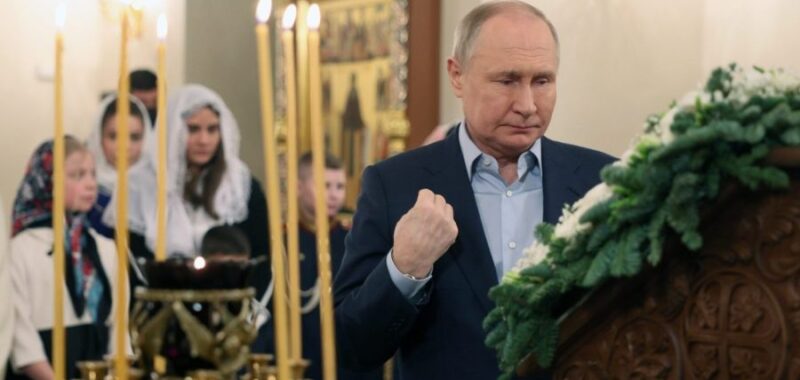
When asked at a recent press conference whether he believes Russia’s war with Ukraine will end in 2025, Vladimir Putin gave an odd answer. “I believe in God,” he said, “and God is with us.”
A self-confident leader who believes the war is going well for his side would have answered with a forceful yes or no, perhaps even making a fist and waving it triumphantly — as did Donald Trump after the failed attempt on his life in Butler, Pennsylvania.
Instead, Putin invoked God, a response that smacks of uncertainty and doubt. Why call on the Almighty’s supposed support if you know you’re winning and believe you’ll win? Why reach out to the heavens, if earthly matters are okay? Perhaps the war is going badly and Putin knows it?
Now, it’s remotely possible that Putin is a sincere believer, a tried-and-true enthusiast of the Russian Orthodox Church’s brand of Christianity, a devotee of the divine who can’t resist constantly calling on God in the course of his everyday labors.
That said, there’s really no reason to believe in his religious sincerity. For one thing, he’s a Russian street tough who clawed his way into the notoriously bloodthirsty KGB; neither his behavior nor his affiliation with a godless criminal institution bespeaks inordinate religiosity.
For another, one doesn’t have to be a cynic to suspect that Putin is obviously playing the religious card in order to reach out to ordinary Russians and underpin his crumbling legitimacy, just as Joseph Stalin did after Nazi Germany’s attack on the Soviet Union in June 1941 revealed that many Soviets greeted the advancing Wehrmacht as their liberator from the communist hell.
For a third, and only half-jokingly, is it reasonable to think that Putin has ever cracked open what Trump claims is his favorite book, the Bible? At least Trump has been photographed holding it. Has Putin? Does he, like Trump, have favorite passages that he just can’t recall?
So, does Putin really believe in God? If one considers that just about everything he utters is a lie, then the answer would have to be no. Certainly, the god he believes in, if he believes in some god, is not the God who gave humanity the Ten Commandments or delivered the Sermon on the Mount.
“Thou shall not kill” doesn’t quite go with a genocidal war against innocent Ukrainians and the targeted killing of one’s political opponents. The Beatitudes are equally at odds with Putin’s style: “Blessed are the meek, for they shall inherit the earth.” “Blessed are the merciful, for they shall receive mercy.” And this one above all: “Blessed are the peacemakers, for they shall be called sons of God.”
Putin’s god might be the God of the Old Testament, who can be vengeful and wrathful, or he might be a pagan god — Zeus, perhaps, or the Slavic version thereof, Perun. In either case, Putin is no Christian. That makes him an Orthodox apostate, a heretic who has no business crossing himself or consorting with clergy — with the exception of the equally criminal Russian Orthodox Patriarch, Kirill, rumored to have been a KGB agent in Soviet times.
Putin may be sincere in believing that God supports the “special military operation,” but how could he possibly know — unless of course God speaks directly to him, perhaps while he’s sleeping the sleep of the monstrously guilty.
And if Putin is sure that God does in fact speak to him, this can only mean that Russia’s dictator is a saint with a direct line to the Almighty. But sainthood for Putin seems like a strange choice for God to have made in light of his continued disregard for the Commandments and Beatitudes. Saints rarely lived perfect lives, but they all experienced conversions and thereupon turned their backs on their sinful lives — something Putin has yet to do. Or did he have a Pauline conversion as his tanks rumbled down the road to Damascus?
So, no, Putin almost surely doesn’t believe in God and God almost surely is not “with” him and his genocidaires. But what if Putin believes he’s God or at least godlike? Blasphemy isn’t a hard sell for an old KGB hand, and delusion is right up the alley for a tyrant who’s held power for 25 years. Ancient emperors regularly believed in their own divinity, so why not Putin?
The question may strike us as outlandish, but only at first glance. Putin fashions himself as the savior of Russia and the world. He’s never wrong. He has a coterie of apostles. Russians worship him. And if he keeps Russia from losing the Ukraine war, he will have performed a miracle.
All that would be left is a crucifixion.
Alexander J. Motyl is a professor of political science at Rutgers University-Newark. A specialist on Ukraine, Russia and the USSR, and on nationalism, revolutions, empires and theory, he is the author of 10 books of nonfiction, as well as “Imperial Ends: The Decay, Collapse, and Revival of Empires” and “Why Empires Reemerge: Imperial Collapse and Imperial Revival in Comparative Perspective.”

